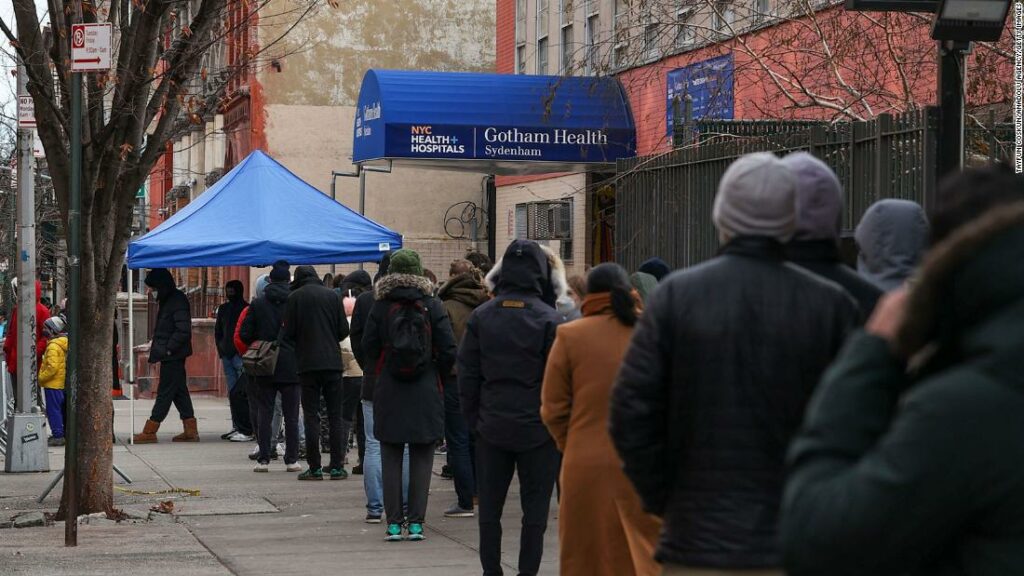Science reporters say new Covid-19 surge is a ‘collective issue’

People in major cities waited in long lines for Covid tests over the weekend… but millions also queued up to watch “Spider-Man” in crowded theaters.On Sunday New York state broke its highest single-day case count for a third consecutive day… but the governor emphasized that “this is not March of 2020.”Saturday’s “SNL” was basically scrapped… but the streets outside 30 Rock were swollen with tourists visiting the Rockefeller Center Christmas Tree.Ten Broadway productions cancelled performances due to positive Covid results… but about 20 other shows went on.I’m sure you are noticing some of these contrasts, too. Washington Post media reporter Paul Farhi tweeted one on Sunday: “Watching dire TV news reports about omicron…followed by commercials for cruises.”Covid confusion is the theme of the moment. Where are the tests? How often should you test if you have access to testing? What should you do if you test positive, even if you have no symptoms? Which protocols should apply for vaxxed and boosted adults versus those who are unvaccinated by choice? Is anyone answering these Qs?It’s time for a shiftSpecifically, a shift toward focusing on severity instead of case numbers. More and more vaccinated and boosted adults are coming around to the view that everyone will get infected by Covid eventually. Vaccinations usually reduce a mighty beast to a minor annoyance. So will US officials help shift the thinking about this subject?CNN’s Kevin Liptak and Jeremy Diamond report that “some of Biden’s advisers are encouraging the administration to begin discussing publicly how to live alongside a virus that shows no signs of disappearing.” However, “steering public attention away from the total number of infections and toward serious cases only — as some Biden advisers have encouraged — could prove a challenge after nearly two years of intense focus on the pandemic’s every up and down.”Here’s the point I tried to make on Sunday’s “Reliable Sources:” We’ve been hearing the words “living with Covid” all year long. The key word in that phrase is not Covid. The key word is living! Recommended reads– Jake Tapper’s open to “State of the Union” on Sunday: “The state of our union is… expecting to get Covid.”– Ashish K. Jha: “The next wave of the pandemic requires charting a middle course between dismay and dismissal…” (The Atlantic)– The chart of the day came courtesy of Scott Gottlieb, who said we’re “thankfully seeing a striking decoupling between new Covid cases and ICU admissions and deaths” in South Africa… (Twitter) — Nate Silver: “I don’t know how well it will extrapolate to the rest of the world but the South Africa data is certainly encouraging. I think it’s important for public health officials and journalists to share good news as well as bad news; otherwise, they risk squandering credibility…” (Twitter)– And/but: Monday’s WaPo says top US health officials warned that the country “will probably see record numbers” of cases and hospitalizations as the new variant “spreads rapidly…” (WaPo)How news outlets are reacting to the surgeHere are a few examples:– CNN has reverted to 2020 office protocols, telling non-essential employees to work from home, in part to “protect those who will be in the office by minimizing the number of people who are there.” A priority for every TV network owner, logically, is to make sure the network stays on the air, even if lots of staffers test positive…– The Washington Post reinstated a mask mandate at its offices on Saturday and told staffers, “Whenever possible for the duration of the holiday period, it would be advisable to hold meetings via Zoom…”– MediaDC, the publisher of the conservative Washington Examiner, asked employees over the weekend to work from home until the new year after a staffer who attended the company’s recent holiday party tested positive for Covid…Three rings of riskJournalists, almost all of whom are vaccinated, are writing and reporting about Covid for different audiences simultaneously. Derek Thompson of The Atlantic told me he perceives three rings of risk: Healthy adults who are vaxxed and boosted are in the least vulnerable “ring;” immunocompromised and elderly individuals are in the middle; and the unvaccinated are the most vulnerable. “I think it’s important for the media to address them individually,” he said, “and say when are we writing for ring one and when are we writing for ring three.”>> Related: One of his colleagues, science writer Katherine Wu, told me she is “deeply, deeply concerned” about the current surge. “This is a collective issue,” she said, and “the decisions people make, regardless of vaccination status, are going to affect the people around them. Not everyone who’s vaccinated and boosted is entirely in the clear…”>> During the same segment, David Leonhardt said he doesn’t think the current Omicron news cycle is an overreaction. “For most boosted people,” he said, “the risks really remain quite low,” but case counts are rising rapidly and “there’s a good chance we’ll have overwhelmed hospitals…”Some unvaxxed adults are still persuadableGregory Zuckerman, author of “A Shot to Save the World: The Inside Story of the Life-or-Death Race for a COVID-19 Vaccine,” has been giving speeches related to his book.”Some audiences have been vaccine-hesitant,” he told me. “I find when the true/full story of how the vaccines were developed is told, and I explain that they resulted from years of courageous/revolutionary work and that nothing was rushed, many are reassured and more willing to roll up their sleeves.” In other words: Some unvaxxed adults are still persuadable. “It’s my view,” Zuckerman said, “that governments around the world can/should do a better job explaining the evolution of these vaccines to get vaccine-hesitant people on board, which is truly crucial to stemming this pandemic.”


